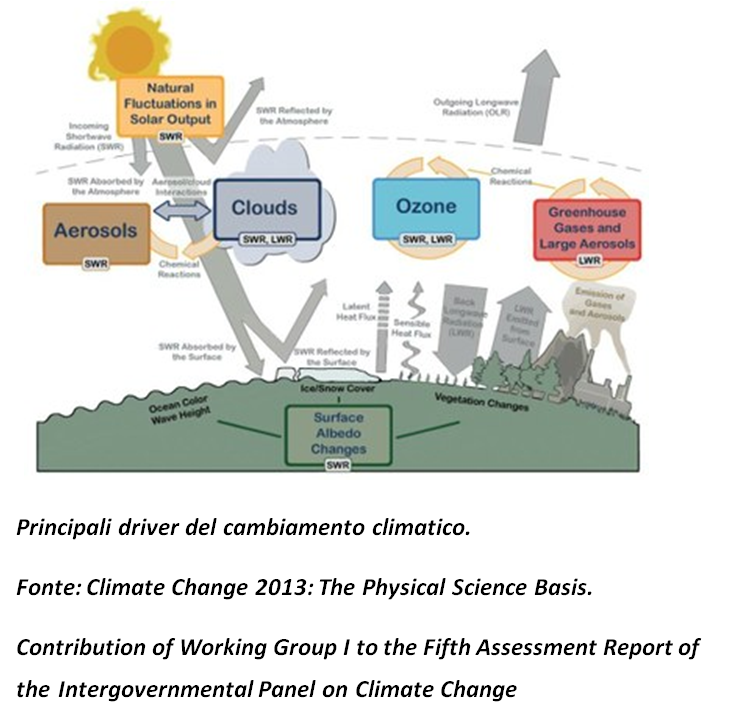Climate change
"Climate is what you expect, weather is what you get" (Edward Lorenz, 1961)
 Since the middle of last century fast climate change have been observed by scientists. The earth's climate is subject to seasonal fluctuations, decadal and centuries-old that are related with natural causes such as the Earth's orbit, solar radiation, ocean circulation and volcanic eruptions (climate variability).
Since the middle of last century fast climate change have been observed by scientists. The earth's climate is subject to seasonal fluctuations, decadal and centuries-old that are related with natural causes such as the Earth's orbit, solar radiation, ocean circulation and volcanic eruptions (climate variability).
During the last years, however, more deep and rapid changes of the climate system have been determined by human being, above all due to the increase of greenhouse gas emissions into the atmosphere. With the first global conference on climate change in 1979, scientists have started to study about how to predict and prevent potential man-made changes in nature and that could have a negative effect on the welfare of humanity.
Sixth IPCC Report
The IPCC (Intergovernmental Panel on Climate Change) is the world's highest meeting of climate experts. The IPCC has the task of evaluating the information available in the scientific, technical and socio-economic fields related to climate change, its possible impacts and adaptation and mitigation options. The first volume of the latest IPCC report of 2021 (AR6) confirms that the Earth's climate is warming (the average temperature on the Earth's surface for the period 2001-2020 higher by about 1°C compared to 1850-1900) and that the human impact on the climate system is unequivocal. Climate change involves not only global warming but also an intensification of the hydrogeological cycle. Globally this leads to an increase in evaporation and precipitation. At the regional level, the impacts depend on the region. The Mediterranean basin is considered a particularly vulnerable area (hot spot) to climate change. For the future, a further increase in greenhouse gas emissions could be associated with other significant changes compared to the past, such as further warming, changes in the amount and type of precipitation, rise in sea levels and changes in the frequency and intensity of extreme climatic events (floods, droughts, cyclones, etc.). Even if the growth of greenhouse gas concentrations in the atmosphere were halted during this century, climate change and sea level rise caused by past, current and future human activities would continue for centuries.
-
Sep 27, 2024 — Sep 28, 2024The European Night of Researchers returns on 27 and 28 September: the 2024 edition of NET - scieNcE Together
-
FlorenceSep 26, 2024 — Sep 28, 2024Water Festival 2024
-
Florence, Fortezza da BassoSep 26, 2024 — Sep 27, 2024Second SNPA Conference. Dealing with water
-
Jul 16, 2024Extreme events map in Italy by ISPRA
-
On line eventJul 11, 2024 09:00 AM — Jul 11, 2024 01:00 PMPresentation of the SNPA Report "The climate in Italy in 2023"
- Italian Emission Inventory 1990-2022. Informative Inventory Report 2024
- Greenhouse gas emissions in Italy. Reduction targets for 2030
- Italian Greenhouse Gas Inventory 1990-2022. National Inventory Report 2024
- Towards resilient cities: the interventions of the experimental Program for adaptation to climate change in urban areas
- ITALY and ENVIRONMENT: Status, Prospects and Scenarios
- Nationwide hydrological water budget: focus on drought and natural availability of renewable water resources. Update to 2022.
- Efficiency and decarbonization indicators in Italy and in the biggest European Countries – Edition 2023
- Atlas of Environmental Data. 2023 edition
- Environment in Italy: an overview. Environmental Data Yearbook 2022
- Italian Greenhouse Gas Inventory 1990-2021. National Inventory Report 2023
